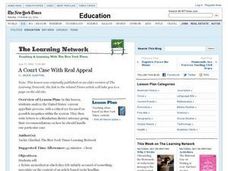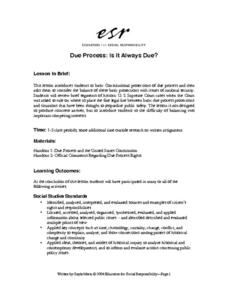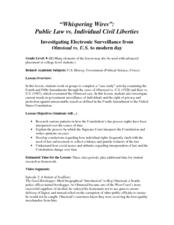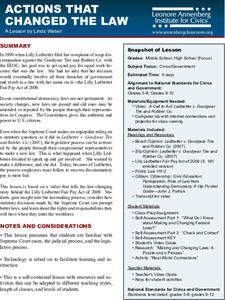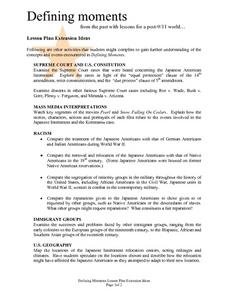Curated OER
What's the Difference Between Procedural and Substantive Due Process?
Students discuss the difference between substantive and procedural due process. They research the uses of due process on the internet and books. They also discuss cases involving students and due process.
Curated OER
What is Due Process Anyway?
High schoolers examine the term due process and its historical origins. They compare and constrast the requirements of due process in the United States Constitution and the Indiana Constitution. They also discuss the difference between...
Curated OER
The Changing Meaning of "Due Process"
Learners examine the United States Constitution and how the application for due process differs in two amendments. They research the changing definition of the term since the Civil War. They use the internet to research press coverage of...
School Improvement in Maryland
Supreme Court Case Overview I
As part of a study of the 14th Amendment to the United States Constitution, class members examine four Supreme Court decisions—Gitlow v. New York, Mapp v. Ohio, Gideon v. Wainwright, and Griswold v. Connecticut—that incorporated the due...
Curated OER
Due Process - Search and Seizure
Help your 11th and 12th graders gain a deeper understanding of Supreme Court decisions and law. The activities include role-play, research, and script writing that all focus on search and seizure laws pertaining to one particular case...
Curated OER
What Makes a Good Law?
Why were laws created? Spark a group discussion on why we need laws to co-exist. Should the sale of some things be outlawed on Sundays? Read a case summary between Target and the state of Minnesota that debated this issue. Ask your...
Curated OER
Due Process
Students explore the concept of due process. In this American law lesson, students view a 9-slide PowerPoint presentation on the topic and then respond to 3 discussion questions about the 5th and 14th amendments.
Curated OER
Mapp v. Ohio (1961)
Students examine warrantless searches and due process. In this Supreme Court lesson, students examine primary documents from Mapp v. Ohio and discuss the implications of the decision.
Curated OER
Gideon v. Wainwright
Students examine the right to counsel and due process. In this Supreme Court lesson, students examine primary documents from Gideon v. Wainwright and discuss the implications of the decision.
Curated OER
Miranda v. Arizona (1966)
Students examine Miranda v. Arizona. In this court decisions lesson, students analyze the self incrimination case and read other supplemental articles about police procedures and due process. Students discuss the Supreme Court decision...
Curated OER
A Court Case with Real Appeal
Students analyze the United States' current appellate process, with a critical eye focused on possible inequities within the system. They then write letters to a Manhattan district attorney giving their recommendations on how he should...
Curated OER
Due Process of Law and the Jim Crow Era
Students analyze eight case studies of Supreme Court decisions regarding due process of law and their impact on American society in the early 20th century. They digest that although the 14th amendment was intended to give federal rights...
Curated OER
It's Your Right: A Civil Rights Brochure
Learners examine the US Constitution, Bill of Rights, and Supreme Court cases in order to broaden their understanding of the US Judicial System. They research a variety of textual and Internet resources to create a tri-fold brochure,...
Curated OER
Due Process: Is It Always Due?
Students explore the basic Constitutional protections of due process and then consider the balance of these basic protections with issues of national security. A variety of segments of U.S. Supreme Court cases are examined in this lesson.
Curated OER
"Whispering Wires": Public Law vs. Individual Civil Liberties
High school student love discussing controversial issues like those brought up in this fourth amendment case study. They examine the 1928 Olmstead vs. U.S. prohibition court case, applying the fourth amendment to determine whether...
Heritage Foundation
Procedural Amendments: Amendments III, IV, and V
So many US Constitution clauses, so little time. The 17th installment in a 20-part series teaches pupils about the Third, Fourth, and Fifth Amendments. Learning through activities such as group work, connecting to current events, and...
Curated OER
Government Lesson Plan: Lesson Plan 8
Students analyze the Fourteenth Amendment. They discuss Reconstruction, read the provisions of the Fourteenth Amendment, define the provisions, and in small groups analyze a Supreme Court case that was impacted by the due process clause.
Curated OER
Case Studies on the Sixth Amendment
Students trace the historical background of the sixth Amendment to the Constitution. They identify the legal issues and legal arguments in the cases studied, and evaluate the court's decisions.
Constitutional Rights Foundation
The Role of the Judiciary
The role of the judicial branch has far reaches into American life. Learners consider its uses with a reading on the branch and a structured conversation on the topic. Together, they work to root their contributions to the discussion in...
Annenberg Foundation
Actions that Changed the Law
The Fair Play Act of 2009 came about due to the actions of one woman. Young historians research Lilly Ledbetter and what she went through to get pay equal to that paid to men for the same work at Goodyear Tire and Rubber Company. The...
Curated OER
Mock Trial
Students rewrite a traditional fairy tale to represent the viewpoint of the villain. They participate in a mock trial of that villain in which all regular court participants (judge, jury, defendant, witnesses, plaintiff, etc) play roles.
Curated OER
Supreme Court June 2010 Decisions Wrap-Up
Students consider constitutional rights. In this Bill of Rights lesson, students complete an activity guide that requires students to examine Bill of Rights-related cases of 2010. Students respond to discussion questions pertaining to...
Curated OER
Defining moments from the past with lessons for a post-9/11 world...
Students examine extension ideas concerning 9/11, Defining Moments. They analyze a variety of Supreme Court cases, the U.S. Constitution, Mass Media Interpretations, Racism, Immigrant groups and U.S. geography. Many questions are asked...
Curated OER
The Bill of Rights
Students examine the intent Bill of Rights. In this American government lesson, students watch segments of the Discovery video "The Bill of Rights." Students discuss and debate the 4 Supreme Court cases featured in the video.










